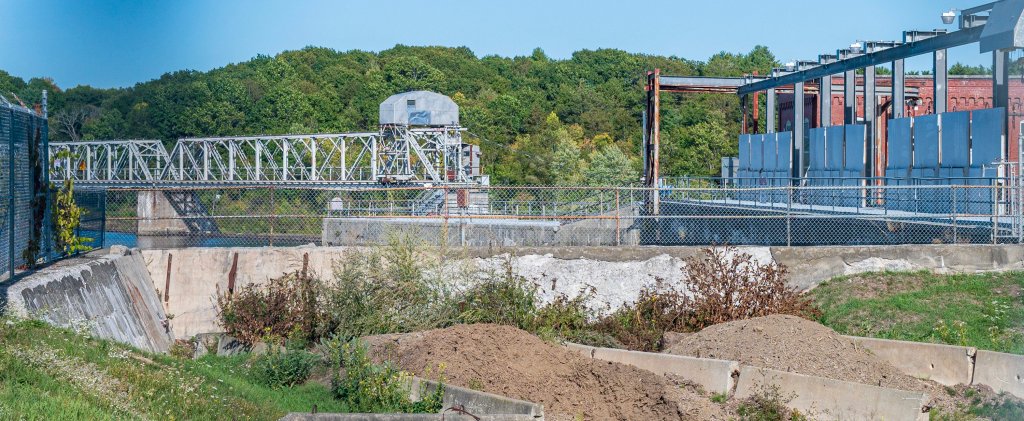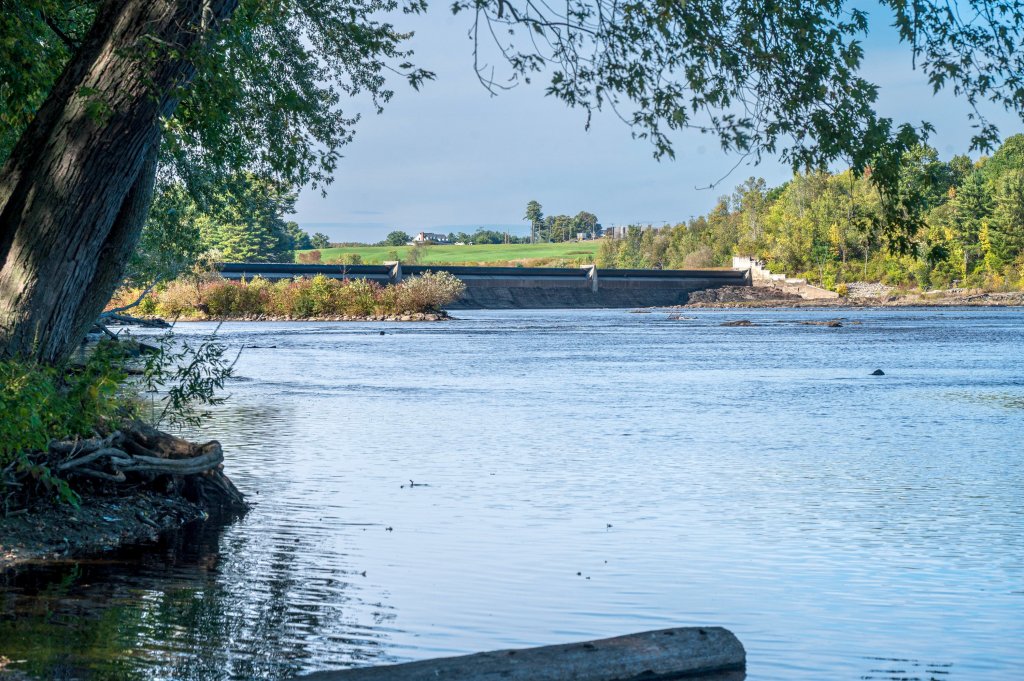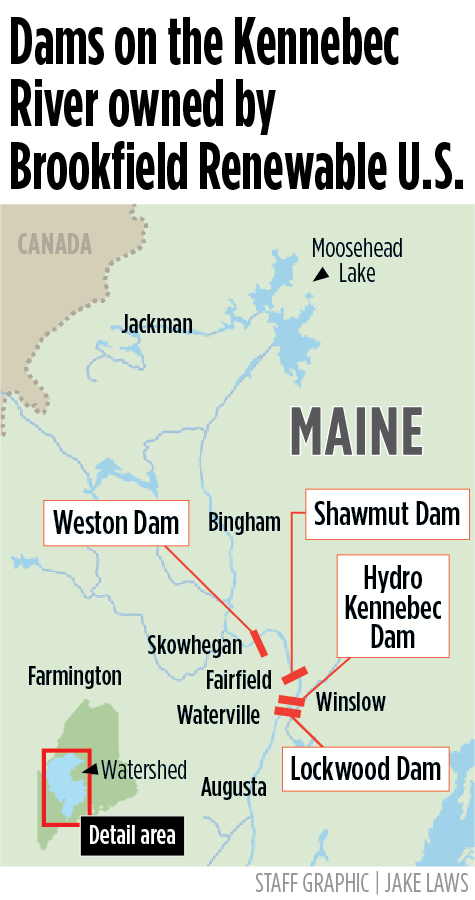
The Nature Conservancy plans to buy four Kennebec River dams from Brookfield Renewable Energy in a move that could reshape the ecology and economy of one of the state’s largest watersheds.
The environmental group and international energy heavyweight announced Tuesday that they signed a sale agreement on Sept. 15.
The Nature Conservancy plans to form a nonprofit, the Kennebec River Restoration Trust, to administer the dams and oversee their decommissioning and removal over the next several years, in partnership with local leaders.
In total, the purchase will cost the The Nature Conservancy $168 million, including the sale, transaction fees and the establishment of the new nonprofit. The Nature Conservancy has already raised $138 million for the sale and plans to collect the remaining funds to close the sale within the next 10 to 12 months.
The Nature Conservancy said in a prepared statement Tuesday that it planned to restore the Kennebec River to its pre-dam state.
“The vision of The Nature Conservancy and our partners is for a free-flowing river on the lower Kennebec, accomplished in a way that both restores the river’s ecological health and strengthens the region’s economic vitality,” Kate Dempsey, the state director of The Nature Conservancy in Maine, said in the statement. “Achieving these twin goals will take time and thoughtful collaboration with local communities. We’re grateful to Brookfield for working with us to find a mutually beneficial solution to restoring balance to the Kennebec River, and to all the partners who have come together to make this once-in-a-generation opportunity possible.”

Alex Mas, the deputy state director for The Nature Conservancy, said the group will need at least $140 million for the “operations and removal” phase, bringing the total project cost to approximately $300 million over the next decade.
Brookfield will continue to operate the dams until they can be decommissioned and will transfer ownership of the dams directly to the Kennebec River Restoration Trust.
The move to sell the dams is years in the making and follows extended legal and regulatory controversy.
The Nature Conservancy first offered to buy the dams almost a year ago, the Bangor Daily News reported at the time, based on information shared by Sen. Brad Farrin, R-Norridgewock. Farrin also told reporters Monday at an event in Skowhegan that the deal was to be announced Tuesday.
The pending sale does not appear to be made out of financial necessity. Brookfield’s renewable energy arm reported modest year-on-year gains and had met quarterly revenue goals as of Aug. 1.
Brookfield Renewable North America CEO Stephen Gallagher said in the statement that the group is still committed to providing hydropower to Maine.
Environmental groups have long argued for the removal of the four Kennebec River dams, which are located in Waterville, Winslow, Fairfield and Skowhegan.
The dams have decimated endangered Atlantic salmon and other sea-run fish populations, conservation advocates say. Following the removal of the Edwards Dam in Augusta in 1999 — a turning point in the history of the Kennebec River — salmon populations have slowly rebounded, but remain thousands below pre-dam numbers from the 19th century.
The decommissioning of the four dams would restore waterway access to the Sandy River and its high-quality salmon breeding grounds, The Nature Conservancy said, while retaining about 200 megawatts (MW) of power generation on the upper Kennebec.
RESTORING SEA-RUN FISH
The Kennebec Coalition — a bloc of environmental groups including the Natural Resources Council of Maine, Atlantic Salmon Federation, Maine Rivers and Trout Unlimited — praised the sale in a statement Tuesday as a first step toward restoring sea-run fish populations.
“We’re entering an exciting new chapter for a stretch of the Kennebec that has been inaccessible to sea-run fish for more than a century,” Luke Frankel, a staff scientist and the woods, waters and wildlife director at the Natural Resources Council of Maine, said in the statement. “Previous experience on the Kennebec and Penobscot proves that removing dams sparks a remarkable recovery of fish, wildlife and new outdoor recreational activities.”
Environmental groups also opposed Brookfield’s recent attempts to renew its license for the Fairfield dam and update licenses for the three others — a status that remains in limbo.
Brookfield initially applied to relicense the 8.65-MW Shawmut Dam in Fairfield in 2020, and later applied to amend the licenses of the Waterville and Winslow dams that together generate 22.35 MW and the 15.98-MW Weston Dam in Skowhegan to reflect the company’s species protection plan.
Federal regulators allowed Brookfield’s petition for the four dams to move forward earlier this year. That approval hinged on new fish passage measures that the Kennebec Coalition said “has not worked anywhere else in the world where fish have had to pass by four dams in a row.”
The approval also required a water quality certification from the Maine Department of Environmental Protection by Oct. 20. The department has not yet provided that certification.
State regulators have previously denied the approval, leading to yearslong legal challenges from Brookfield, a subsidiary of a Toronto-based investment giant that owns more than a dozen hydroelectric dams in Maine.
Business leaders and politicians have argued the dams are too economically valuable to give up.
A 2022 study by the Waterville-based Mid-Maine Chamber of Commerce found that the four dams support more than 3,200 jobs in Kennebec and Somerset counties, including two mills along the river.
CONCERNS ABOUT SAPPI MILL
Notably, Skowhegan’s Somerset Mill, operated by Sappi and its 750 unionized workers, relies on the Fairfield mill’s impoundment for its water intake and wastewater discharge systems.
If the dam were removed, water levels would be too low for the mill to use, Sappi officials have said. That possibility caused political uproar when state regulators denied Brookfield’s water quality permit in 2021.
Gov. Janet Mills even promised workers in 2021 that the mill would not be allowed to close.
On Tuesday, a spokesperson for the governor said her position is unchanged and that she will not support anything that would result in the mill’s closure.
“The governor and her administration will work closely with The Nature Conservancy and the leadership of Sappi to ensure that the Somerset Mill remains open and thriving and continues to be a source of good-paying jobs in rural Maine as well as an important contributor to Maine’s critical forest products economy,” Ben Goodman said in an email. “She believes that can be accomplished as waterways are restored.”
The sale of the dams, Farrin said last fall, was contingent on a solution for the Sappi mill’s water usage needs, since it was likely that The Nature Conservancy would dismantle at least some of the dams.
The Nature Conservancy said Tuesday it was “100% committed to developing a solution with Sappi that fully addresses the Somerset Mill’s long-term water system needs,” and that any dam removal scenario would protect the mill’s future.
The details of such a scenario were not immediately clear, and Sappi officials indicated in a statement Tuesday that no agreement had yet been reached.
The officials urged caution and said they were concerned about the eventual removal of the Shawmut dam.
“We share the goal of protecting Maine’s rivers and believe there are solutions that will allow fisheries to thrive without putting thousands of good jobs at risk,” said Sean Wallace, Sappi North America’s vice president of research, development and sustainability. “We remain hopeful that we can work with The Nature Conservancy, our local communities, state and federal agencies and our legislative delegation to find a balanced path forward, including options that preserve the impoundment.”
The Maine Chamber of Commerce, the state’s largest business organization, also said it was “carefully monitoring” the situation at the Somerset Mill. Chamber President and CEO Patrick Woodcock said he was worried that the dam purchase would jeopardize the recent $500 million improvements Sappi made to the mill.
“While we will collaborate with any partner, including the Nature Conservancy, the Maine State Chamber of Commerce will be focused on ensuring that plans for the Kennebec work for the state’s economy and support jobs in rural Maine,” Woodcock said in a statement.
CRITICISM OF SALE
Farrin, who represents Skowhegan in the Maine Senate, criticized the sale Tuesday in a statement through the Senate Republican Office.
He blamed the Mills administration for “refusing to issue the dam’s water quality certificate for years” and called her promise to keep the Somerset Mill open “hollow.”
“While the sale and likely decommissioning of these dams will be a lengthy process, I encourage local businesses, municipalities, landowners and residents to stay informed and get involved,” Farrin said in the statement. “We must make it very clear to the administration and The Nature Conservancy that the decommissioning of these dams is not in our best interest.”
Combined, municipalities along the Kennebec River receive hundreds of thousands in property tax payments from Brookfield and could be in danger of losing that income when the dams are decommissioned.
But that would not occur for several years, the groups said in the news release Tuesday. Brookfield will continue to pay property tax on the dams until the properties are transferred to the new ownership, and dam removal will not take place in the immediate future.
Waterville Mayor Mike Morris said today’s announcement was the first he had heard about The Nature Conservancy’s purchase of the dams, and that he was initially struck by the potential loss of about $250,000 in property taxes after the dams’ removal. He said he will work with the city manager and finance director to prepare for that possibility.
He said he was also concerned about the potential loss of jobs for Waterville residents working at the Somerset Mill in Skowhegan.
“I’m open to the conversation,” Morris said. “It sounds like (The Nature Conservancy is) going to be pretty open. I am looking forward to speaking with them as we move through the process and certainly keeping them abreast of our concerns.”


We invite you to add your comments. We encourage a thoughtful exchange of ideas and information on this website. By joining the conversation, you are agreeing to our commenting policy and terms of use. More information is found on our FAQs. You can modify your screen name here.
Comments are managed by our staff during regular business hours Monday through Friday as well as limited hours on Saturday and Sunday. Comments held for moderation outside of those hours may take longer to approve.
Join the Conversation
Please sign into your CentralMaine.com account to participate in conversations below. If you do not have an account, you can register or subscribe. Questions? Please see our FAQs.